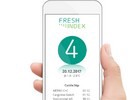The FreshIndex, which is supported by the SME-NetC measure, is intended to help solve one of the key challenges of our time: the premature disposal of edible food. According to recent studies, in the EU alone, foodstuffs worth 143 billion euros are unnecessarily being dumped every year. This is where FreshIndex comes in. The Dynamic Effective Date (DED), developed as part of the project, will provide greater transparency along the value chain and better predictability, thereby reducing the amount of unused food.
At the same time, costs can be opti mized and the competitiveness of all those involved in the food industry increased. The DED is not printed as a fixed date, but is calculated dynamically for temperature-monitored products. For example, a DED can be read out on digital price tags, in the online grocery store or via an app.
mized and the competitiveness of all those involved in the food industry increased. The DED is not printed as a fixed date, but is calculated dynamically for temperature-monitored products. For example, a DED can be read out on digital price tags, in the online grocery store or via an app.
On 5 August the FreshIndex started the field phase. One of the main goals is to review the previous work of the network partners in the project and to gather information for the final design of the FreshIndex app. Because: The freshness of food is not only an objectively measurable criterion, but is also a highly emotional topic. For example, much too often even consumable foods are disposed of, because they are perceived as no longer fresh.
In addition to appearance, smell and taste, information about the product quality and its presentation play a major role. From September 11, 2019, onwards, employees and customers can test the app under realistic conditions nationwide in five participating metro wholesale stores, adjust parameters such as their own storage temperatures and observe the corresponding effects on shelf life directly in the app.
From this testing of the FreshIndex app, the project partners expect constructive feedback from the users on usability. Prof. Dr. Gunnar Stevens, consumer computer scientist at Bonn-Rhein-Sieg University of Applied Sciences, is very excited: "Of course we thought a lot in advance. But by field testing, we hope to gain a lot of new insights into how customer acceptance is and how the FreshIndex is understood and evaluated by the users."
Source: Metro AG / Gastroinfoportal